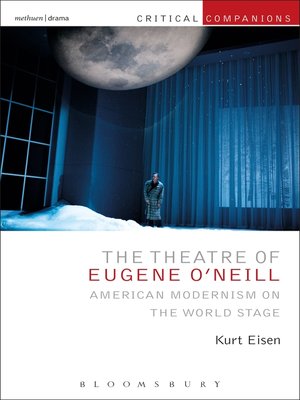The Theatre of Eugene O'Neill
ebook ∣ American Modernism on the World Stage · Critical Companions
By Kurt Eisen

Sign up to save your library
With an OverDrive account, you can save your favorite libraries for at-a-glance information about availability. Find out more about OverDrive accounts.
Find this title in Libby, the library reading app by OverDrive.



Search for a digital library with this title
Title found at these libraries:
| Library Name | Distance |
|---|---|
| Loading... |
Named a Choice Outstanding Academic Title of the Year 2018
The Theatre of Eugene O'Neill offers a new comprehensive overview of O'Neill's career and plays in the context of the American theatre. Organised thematically, it considers his modernist intervention in the theatre, offers readers detailed analysis of the plays, and assesses the recent resurgence in his reputation and new approaches to staging his work. It includes a study of all his major plays-The Emperor Jones, The Hairy Ape, The Iceman Cometh, Long Day's Journey Into Night, A Moon for the Misbegotten and Desire Under the Elms-besides numerous other full length and one act dramas.
Eugene O'Neill is generally credited with inventing modern American drama, in a time of cultural ferment and lively artistic and intellectual change. Yet O'Neill's theatrical instincts were always shaped by American stage traditions that were inextricable from his sense of himself and his own national culture. This study shows that his theatrical modernism represents not so much a break from these traditions as a reinvention of their scope and significance in the context of international stage modernism, offering an image of national culture and character that opens new possibilities for the stage while remaining rooted in its past.
Kurt Eisen traces O'Neill's modernism throughout the dramatists's work: his attempts to break from the themes, plots, and moral conventions of the traditional melodramatic theatre; his experiments in stagecraft and theme, and their connection to traditional theatre and his European modernist contemporaries; the turn toward direct and indirect self-representation; and his critique of the family and of American 'pipe dreams' and the allure of success.
The volume additionally features four contributed essays providing further critical perspectives on O'Neill's work, alongside a chronology of the writer's life and times.
The Theatre of Eugene O'Neill offers a new comprehensive overview of O'Neill's career and plays in the context of the American theatre. Organised thematically, it considers his modernist intervention in the theatre, offers readers detailed analysis of the plays, and assesses the recent resurgence in his reputation and new approaches to staging his work. It includes a study of all his major plays-The Emperor Jones, The Hairy Ape, The Iceman Cometh, Long Day's Journey Into Night, A Moon for the Misbegotten and Desire Under the Elms-besides numerous other full length and one act dramas.
Eugene O'Neill is generally credited with inventing modern American drama, in a time of cultural ferment and lively artistic and intellectual change. Yet O'Neill's theatrical instincts were always shaped by American stage traditions that were inextricable from his sense of himself and his own national culture. This study shows that his theatrical modernism represents not so much a break from these traditions as a reinvention of their scope and significance in the context of international stage modernism, offering an image of national culture and character that opens new possibilities for the stage while remaining rooted in its past.
Kurt Eisen traces O'Neill's modernism throughout the dramatists's work: his attempts to break from the themes, plots, and moral conventions of the traditional melodramatic theatre; his experiments in stagecraft and theme, and their connection to traditional theatre and his European modernist contemporaries; the turn toward direct and indirect self-representation; and his critique of the family and of American 'pipe dreams' and the allure of success.
The volume additionally features four contributed essays providing further critical perspectives on O'Neill's work, alongside a chronology of the writer's life and times.







